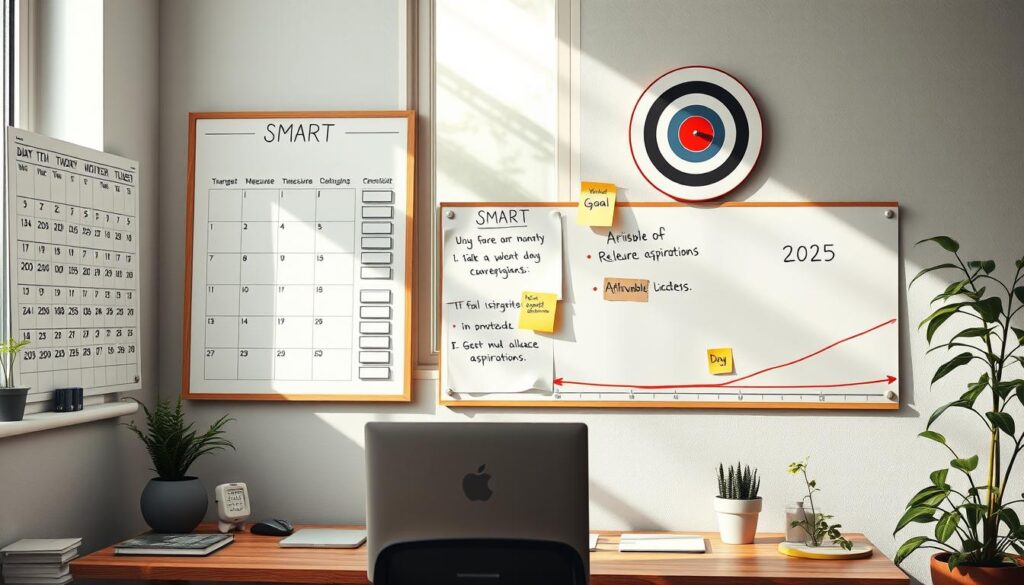As 2025 approaches, you face a key moment for personal growth. Imagine shaking off doubts that have held you back. Studies show, 85% of workers feel lost without clear goals. But you can turn this around.
Your path to 2025 goals is a journey of self-discovery. It’s about growing, not being perfect. 76% of skilled people fear failure, holding them back. Your dedication to growth is a bold move.
This isn’t just another guide on setting goals. It’s a guide to unlock your true self. By being open and planning wisely, you’ll make your dreams real.
Key Takeaways
- Recognize that goal clarity is the foundation of personal success
- Challenge internal barriers preventing your growth
- Develop a flexible approach to goal setting
- Embrace continuous learning and self-reflection
- Create actionable strategies for sustainable personal development
Understanding the Importance of Life Goals
Traveling through life and work needs more than just hopes. Goal setting is like a compass that points you towards success and growth. Your dreams are what push you towards real change.
Why Set Goals?
Goals are not just dreams in the distance. They are detailed plans for your future. By setting clear goals, you make a roadmap that helps you:
- Stay focused on what’s important
- See how far you’ve come
- Keep going even when it’s hard
- Make your dreams real
“The future belongs to those who believe in the beauty of their dreams.” – Eleanor Roosevelt
The Impact of Clear Objectives on Success
Having clear goals makes success more likely. Here are some tips to help you reach your goals:
- Split big goals into smaller steps
- Set realistic deadlines
- Check your progress often
- Be ready to change plans if needed
Your growth depends on your dedication to self-improvement and setting goals. Whether you want to publish a book, manage your time better, or strengthen family bonds, clear goals help make your dreams come true.
Self-Reflection: Discovering Your True Aspirations

Unlocking your true self starts with deep self-reflection. Your journey to personal growth begins with knowing your deepest desires. Then, you create a plan for your future.
Dr. Patricia Anderson, a leading figure in psychology and goal setting, highlights the power of looking inward.
“Self-reflection is the compass that guides you toward your authentic path,”
she says.
Techniques for Self-Discovery
Starting your self-discovery journey needs the right strategies. Here are some effective ways to uncover your true self:
- Practice mindfulness meditation to quiet external noise
- Use reflective journaling to explore your inner thoughts
- Create a personal vision board representing your aspirations
- Embrace the Ikigai framework to align passion with purpose
Journaling Your Thoughts and Dreams
Journaling is a powerful tool for understanding your personal growth path. By writing down your thoughts, you lay out a clear path for your future.
Key elements to focus on in your self-reflection include:
- Craft an authentic personal narrative
- Develop realistic strategies
- Identify purpose-driven paths
- Confront and overcome imposter syndrome
- Master your mindset
Studies show that over 90% of goals set in a Personal Leadership Plan can be achieved through regular self-reflection. By setting aside time for introspection, you can turn your dreams into reality.
Setting SMART Goals for 2025
Turning your dreams into reality starts with setting smart goals. In 2025, using SMART goals is key to achieving your goals and planning for the future.

Setting goals is more than just dreaming. Research shows 94% of people who set SMART goals actually achieve them. This method makes your dreams real by creating clear plans.
Decoding SMART Goals
SMART goals are your guide to success. They break down big goals into smaller steps. Let’s look at what makes a goal SMART:
- Specific: Clearly define what you want to accomplish
- Measurable: Set up ways to track your progress
- Achievable: Make sure your goals are within reach
- Relevant: Make sure your goals fit with your life’s bigger picture
- Time-bound: Set deadlines to stay on track
Crafting Your SMART Goal Strategy
To turn dreams into goals, you need a plan. Here are examples to help you set goals for 2025:
| Life Area | SMART Goal Example | Achievement Probability |
|---|---|---|
| Financial | Save $10,000 for house down payment by December 31, 2025 | 76% likely to succeed |
| Health | Complete a half-marathon by June 30, 2025, following a 16-week training program | 94% achievable with structured plan |
| Professional | Earn professional certification in digital marketing by September 2025 | 85% success rate with consistent effort |
“Your goals are the roadmap to your dreams. Make them specific, measurable, and meaningful.” – Success Strategist
Don’t let unrealistic goals hold you back. By using SMART goals, you’re setting yourself up for success in 2025.
Personal Growth: Skills to Cultivate
Your journey of personal growth is a transformative path. It requires dedicated skill development and continuous learning. Embracing self-improvement means identifying and nurturing key skills. These skills will propel you toward success and fulfillment.

Identifying Key Skills for Development
Skill development is the cornerstone of personal growth. Research from The Wisdom Research Project highlights eight critical traits essential for personal transformation:
- Resilience: The most critical trait for navigating life’s challenges
- Kindness: Building meaningful connections and emotional intelligence
- Positivity: Maintaining an optimistic outlook
- Creativity: Unlocking innovative problem-solving abilities
- Curiosity: Driving continuous learning and personal expansion
Resources for Skill Enhancement
Your personal growth strategy should include diverse learning opportunities. Consider these powerful resources for skill development:
| Learning Resource | Skill Focus | Potential Impact |
|---|---|---|
| Online Courses | Technical & Soft Skills | Flexible Learning |
| Mentorship Programs | Professional Guidance | Personalized Development |
| Professional Workshops | Interactive Learning | Networking Opportunities |
“Continuous learning is the minimum requirement for success in any field.” – Brian Tracy
By prioritizing skill development and maintaining a growth mindset, you’ll create a robust framework for personal growth and self-improvement. Remember, learning is a lifelong journey. It opens doors to unprecedented opportunities.
Financial Stability: 2025 Budgeting Strategies
Planning your finances well is key to reaching your goals. As 2025 gets closer, knowing how to manage money is more important than ever. A recent study found that 38% of Americans see financial stability as their main goal for next year.

Creating strong financial goals is more than just numbers. It’s about setting up a path to your dreams. Let’s look at some practical ways to make your financial base stronger.
Setting Financial Goals with Purpose
Your financial goals should match your life’s big picture. Experts say to start small to gain momentum:
- Save $20 per paycheck consistently
- Automate retirement contributions
- Review and reduce unnecessary expenses
Creating a Sustainable Budget
Budgeting is your guide to financial stability. Here are some tips to follow:
- Track income and expenses carefully
- Use budgeting apps for real-time tracking
- Apply the 50/30/20 rule for balanced spending
“Forgiving past financial mistakes is the first step toward future success.” – Financial Wellness Expert
| Financial Goal | Action Step | Potential Impact |
|---|---|---|
| Reduce Credit Card Debt | Negotiate interest rates | Save up to 6% in interest |
| Increase Savings | Automate monthly transfers | Build emergency fund |
| Investment Growth | Diversify investment portfolio | Long-term financial stability |
Pro Tip: Changing how you see money means seeing financial goals as paths to your dream life, not just numbers.
By using smart money management, you can build a strong financial future. This future will support your 2025 goals.
Health and Wellness: Your Path to a Fulfilling Life
Wellness is more than just being fit. In 2025, it’s about growing as a whole person. It’s about linking your mind and body for a better life.

Today’s wellness plans are all about lasting, real changes. They cover all areas of health. Start your journey by making choices that make you feel good.
Establishing Healthy Habits
Building lasting habits needs a plan. Here are some tips for lasting wellness:
- Incorporate 30 minutes of physical activity most days
- Gradually improve nutrition through mindful choices
- Prioritize consistent sleep schedules
- Practice regular movement you genuinely enjoy
“Small, consistent changes create significant long-term health improvements” – Elizabeth Harris, MS, RDN
Mental Wellness and Self-Care Practices
Self-care is key for your mind. It helps make your life better.
| Mental Wellness Strategy | Daily Implementation |
|---|---|
| Mindfulness Meditation | 10-15 minutes daily |
| Gratitude Journaling | 3-5 positive reflections |
| Setting Emotional Boundaries | Consistent communication |
In 2025, your wellness journey is about balance. Focus on healthy habits and mental wellness. This way, you’ll have a strong self-care routine for your goals.
Building Meaningful Relationships

Your personal connections are key to success in 2025. They’re not just social chats. They’re powerful networks that can change your life and career.
By building meaningful relationships, you open doors to growth, support, and deep personal development.
The Importance of Networking
Networking is more than just collecting business cards or online friends. It’s about building real support systems that help you reach your goals. Here are some smart ways to do it:
- Attend industry events with clear goals in mind
- Use platforms like LinkedIn to connect professionally
- Find mentors in your field
- Join groups that match your career dreams
“The quality of your life is the quality of your relationships.” – Unknown
Strengthening Your Current Relationships
Your current friends and family are treasures of support. Spend time improving these relationships by:
- Listening actively
- Having regular, meaningful talks
- Showing real empathy
- Creating shared goals
Studies show that 47% of employee engagement grows when teams work together towards goals. By focusing on real relationships, you’re not just growing your network. You’re building a support system that boosts your growth in all areas of life.
Remember: Your network is your net worth in 2025.
Career Development: Plan for Your Professional Future
Planning your career is key to success in today’s fast-paced world. The job market changes often, and you need to grow with it. On average, people have about 12 jobs in their lifetime. So, having a solid career plan is more important than ever.

Professional growth is not just about jumping from job to job. It’s about making a thoughtful plan that matches your dreams. Good career planning means knowing what you want now and in the future.
Setting Career Milestones
Setting career goals should be both big and reachable. Here are some tips:
- Set clear goals for the next 1-2 years
- Work on learning new skills
- Look for chances to be recognized at work
- Make sure your goals are measurable
Networking and Professional Growth
“Your network is your net worth in the professional world.”
Networking is a powerful way to grow in your career. Here are some ways to network:
- Go to industry events and conferences
- Join groups related to your field
- Connect with others on professional social media
- Find a mentor
| Career Goal Type | Timeframe | Focus Area |
|---|---|---|
| Short-term Goals | 1-2 Years | Skill Development |
| Long-term Goals | 3-5 Years | Career Advancement |
| Professional Vision | 5-10 Years | Industry Impact |
Only 9% of people reach their career goals. But with good planning and staying on track, you can boost your chances of success.
Embracing Change: Flexibility in Achieving Goals

Life is full of surprises and unexpected twists. By age 38, people face an average of 36 big life changes. This shows how important it is to be adaptable when reaching for your goals.
Being able to handle change can be the key to success. It’s vital to build resilience and problem-solving skills. These help you deal with life’s many challenges.
The Role of Adaptability
Adaptability is not just a skill; it’s a way of thinking. Here are some strategies for embracing change:
- Stay open to new views and learning chances
- Develop flexible thinking
- See challenges as chances to grow
- Keep improving yourself all the time
“The measure of intelligence is the ability to change.” – Albert Einstein
Overcoming Obstacles and Challenges
Managing change needs a proactive mindset. Your ability to bounce back and adjust plans quickly is key.
Here are some problem-solving tips:
- Break down big challenges into smaller steps
- Stay positive and focused on solutions
- Learn from past experiences
- Ask for help when you need it
Remember, being flexible doesn’t mean giving up on your goals. It’s about finding new ways to reach them.
Tracking Your Progress: Staying Accountable
Reaching your life goals is more than just setting them. You need to track your progress and stay accountable. This means creating a strong system for checking how you’re doing and evaluating yourself.
![]()
Good goal tracking begins with picking the right ways to keep an eye on your progress. Studies show that writing down your goals can boost your chances of success by 42%.
Methods for Monitoring Your Goals
- Use digital tracking apps like Trello or Notion
- Create a dedicated goal journal
- Develop a spreadsheet for detailed progress tracking
- Set up regular check-in reminders
The Benefits of Regular Check-Ins
Regular self-assessment keeps you motivated and helps you spot any hurdles. By having a monthly reflection routine, you can:
- See how far you’ve come compared to your goals
- Change plans if something’s not working
- Enjoy your small wins
- Stay on track
| Goal Type | Tracking Frequency | Recommended Tools |
|---|---|---|
| Financial Goals | Monthly | Mint, YNAB |
| Health Goals | Weekly | MyFitnessPal, Strava |
| Professional Development | Quarterly | LinkedIn Learning, Notion |
“What gets measured gets managed.” – Peter Drucker
Accountability isn’t about being perfect. It’s about making steady progress and intentional effort. Break down big goals into smaller steps. This makes them feel less daunting and more doable.
Celebrating Success: Recognizing Your Achievements
Your journey of goal attainment shows great personal growth and determination. Success celebration is not just about reaching the end. It’s about celebrating every step towards your dreams. Studies show that recognizing achievements boosts motivation to keep going.
Achievement recognition is key to keeping momentum. Take time to think about the milestones you’ve reached, no matter how small. Whether it’s learning a new skill, managing a project, or overcoming a challenge, each success is worth celebrating.
Reflecting on your progress helps you see how far you’ve come. You might want to create a visual journal or a vision board to track your growth. Use apps like Notion or Todoist to log your successes. These can remind you of your strength and ability.
Success is an ongoing journey. See each milestone as a chance to recharge, learn, and aim for more. Celebrating your achievements will keep you motivated and ready for even bigger successes ahead.
FAQ
How do I start setting life goals for 2025?
Start by really thinking about what you want. Use journaling, meditation, and honest thinking to find out. Look beyond what others expect and dream of your perfect future.
Then, break down your dreams into clear, doable steps. Make sure these steps match your values and goals.
What makes a goal SMART?
A SMART goal is clear, measurable, achievable, relevant, and has a deadline. For example, “I want to get fit” is not specific. But “Complete a half-marathon by June 30, 2025, with a 16-week plan” is.
This makes your goals easy to follow and track.
How can I stay motivated while working towards my goals?
Stay motivated by tracking your progress and celebrating small wins. Use apps, journals, and set regular check-ins. Having someone to hold you accountable helps too.
See challenges as chances to grow and stay flexible and resilient.
What skills should I focus on developing in 2025?
Focus on skills that match your career and interests. Both technical and soft skills are important. Look into online courses, workshops, and mentorship.
Keep learning and being adaptable to stay ahead in a changing world.
How important is financial planning in achieving life goals?
Financial stability is key to reaching your goals. Use the 50/30/20 rule to budget. Set financial goals like saving for a house or paying off debt.
Use apps to track your money and plan wisely to support your goals.
How do I balance personal and professional goals?
Balance by focusing on all areas of your life. Prioritize health, relationships, and personal and professional growth. Set goals that support your whole life.
Remember, taking care of yourself helps you succeed in your career too.
What if I encounter setbacks while pursuing my goals?
See setbacks as chances to learn, not failures. Stay positive, solve problems, and adapt. Learn from challenges and keep moving forward.
Personal growth is a journey of learning and improvement.
Source Links
- Unlocking Your Potential: Overcoming the Barriers to Growth in 2025 – https://www.linkedin.com/pulse/unlocking-your-potential-overcoming-barriers-growth-2025-chris-baker-05kle
- Unlock Your Potential in 2025: A Blueprint for Your Best Year Yet! – https://medium.com/wholistique/unlock-your-potential-in-2025-a-blueprint-for-your-best-year-yet-69ab88160fc9
- Unlocking Your Potential: Setting Powerful Intentions for 2025 – https://www.linkedin.com/pulse/unlocking-your-potential-setting-powerful-intentions-2025-la-faber-utdpc
- 2025 Goals And Resolutions: Back To A Simple Retirement Life – https://www.financialsamurai.com/2025-goals-and-resolutions-back-to-a-simple-life/
- How to set goals for 2025! – https://medium.com/@Benji_Fernandes/how-to-set-goals-for-2025-0d459ab590ef
- 5 Questions To Ask Yourself To Get Clear On Your 2025 Career Goals | Essence – https://www.essence.com/news/money-career/get-clear-2025-career-goals/
- Transforming Fear into Self-Reflection: Visioning for 2025 – https://www.linkedin.com/pulse/transforming-fear-self-reflection-visioning-2025-couttee-jenkins-uynwf
- Achieve More in 2025: How to Set SMART Goals for Lasting Success | Hope for the Warriors – https://www.hopeforthewarriors.org/achieve-more-in-2025-how-to-set-smart-goals-for-lasting-success/
- Setting SMART Goals For The New Year And Tips To Achieve Them – https://www.forbes.com/sites/tiffanygrant/2024/12/26/setting-smart-goals-for-the-new-year-and-tips-to-achieve-them/
- Setting Your Goals and What You Want For 2025 – Depth Not Width Brand Blog – https://www.depthnotwidth.com/setting-your-goals-and-what-you-want-for-2025/
- 8 Self-Improvement Goals for the New Year – https://www.psychologytoday.com/intl/blog/common-wisdom-insights/202501/8-self-improvement-goals-for-the-new-year
- 20 Daily Goals For Self-Improvement In 2025 – https://www.betterup.com/blog/goals-for-self-improvement
- 5 advisors offer important tips for managing your money in 2025 – https://www.cnbc.com/2024/12/31/5-advisors-offer-important-tips-for-managing-your-money-in-2025.html
- 10 tips from experts to help you change your relationship with money in 2025 – https://www.voicenews.com/2025/01/01/financial-resolutions-2025/
- Setting Realistic Wellness Goals for 2025 – https://boldbotanica.com/blogs/news/setting-realistic-wellness-goals-for-2025?srsltid=AfmBOooPZu9Qx6O8Xy8krXPWR3qRI7yd0TbVKdNABfzMQIhyLht4-iy2
- Customized In Home Physical Therapy & Wellness Services | Live Your Life™ – https://liveyourlifept.com/blog/2025/01/03/new-year-healthier-you-setting-sustainable-wellness-goals-for-2025/
- 12 health resolutions to consider adopting in 2025 – https://www.yahoo.com/lifestyle/new-years-resolutions-health-201401083.html
- Building a Purposeful 2025: Start with Questions, Not Goals – Depth Not Width Brand Blog – https://www.depthnotwidth.com/building-a-purposeful-2025/
- Planning for 2025: Setting Meaningful Goals with Others in Mind – https://sarahboxx.com/planning-for-2025-setting-meaningful-goals-with-others-in-mind/
- Setting Meaningful Goals for 2025 – https://blushandgold.co.uk/blogs/the-blog/setting-meaningful-goals-for-2025?srsltid=AfmBOorkoL8Ui-4EEjkYe9YFq0Z7tzKiX6I-qBZ0nIF8wl__8FhOiLEQ
- 10 Examples of Professional Goals for 2025 | Together Mentoring Software – https://www.togetherplatform.com/blog/10-examples-of-professional-goals-for-2024
- How To Set A 2025 Resolution For Your Career You’ll Actually Achieve – https://www.forbes.com/sites/alyssajaffer/2024/12/31/how-to-set-a-2025-resolution-for-your-career-youll-actually-achieve/
- Set Your Intentions for 2025: Embracing Change, Achieving Goals, and Celebrating Personal Growth – https://www.linkedin.com/pulse/set-your-intentions-2025-embracing-change-achieving-goals-roche-jwzmc
- Setting goals 2025 — Your Journey Starts With You! – https://www.coachwithcinzia.com/articles/setting-goals-for-2025-finding-clarity-in-chaos
- How to Set Goals for 2025: Your Guide to a Year of Success and Fulfillment – https://www.linkedin.com/pulse/how-set-goals-2025-your-guide-year-success-dr-forbes-riley-miihe
- How to turn your New Year’s intentions into real, measurable goals for success – https://medium.com/@desireestapleton/how-to-turn-your-new-years-intentions-into-real-measurable-goals-for-success-93b1792c792c
- Unlock Your Success: Achieve Your Goals in 2025! – https://vocal.media/motivation/unlock-your-success-achieve-your-goals-in-2025
- Begin 2025 With Clarity: The Power Of Year-End Reflection – https://www.forbes.com/sites/brycehoffman/2024/12/31/begin-2025-with-clarity-the-power-of-year-end-reflection/
